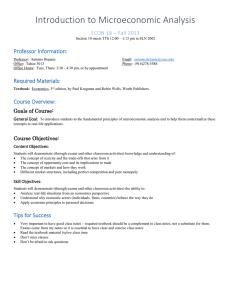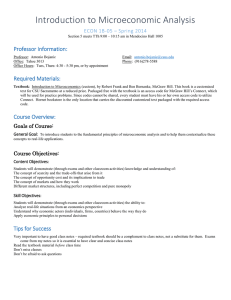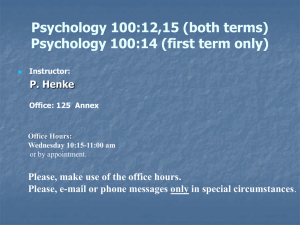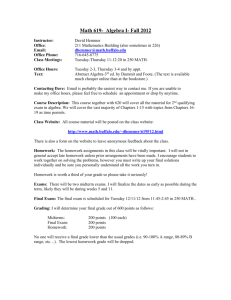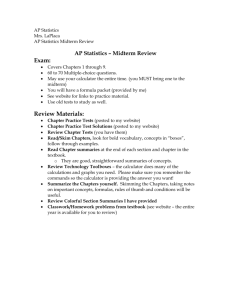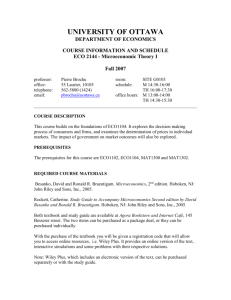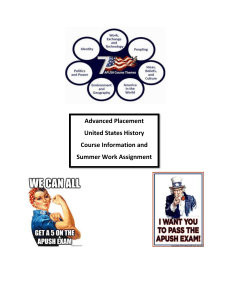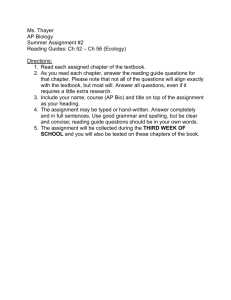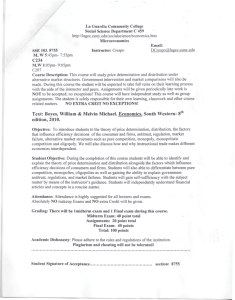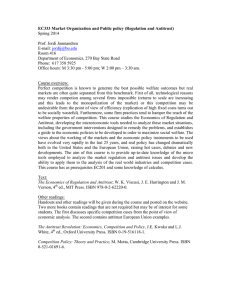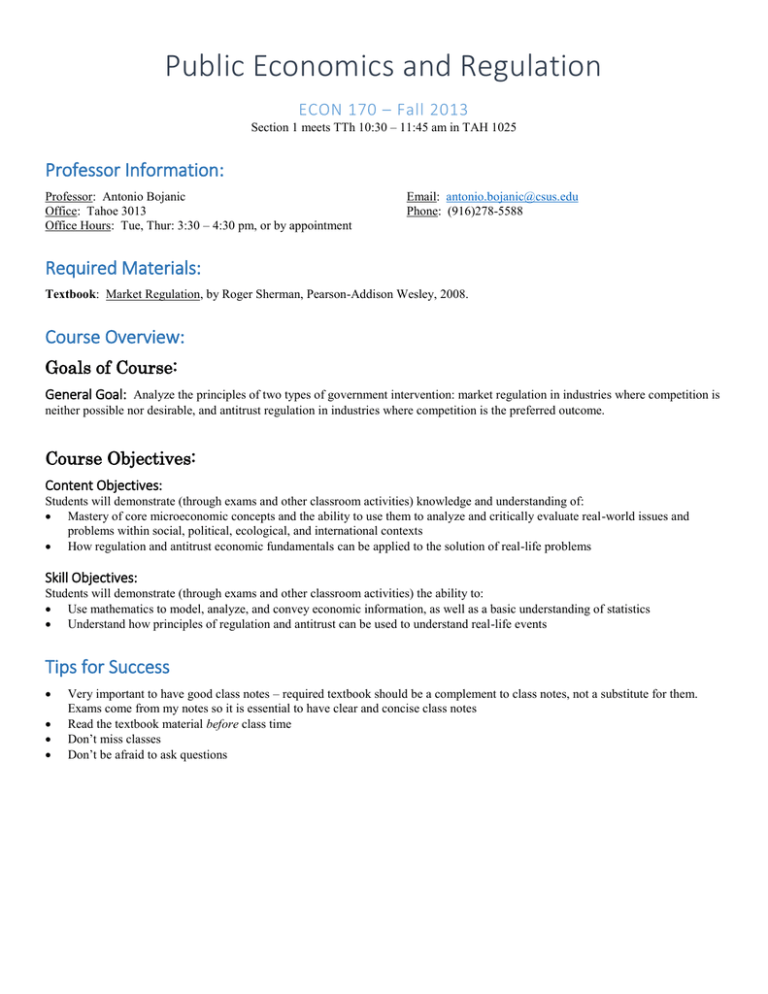
Public Economics and Regulation
ECON 170 – Fall 2013
Section 1 meets TTh 10:30 – 11:45 am in TAH 1025
Professor Information:
Professor: Antonio Bojanic
Office: Tahoe 3013
Office Hours: Tue, Thur: 3:30 – 4:30 pm, or by appointment
Email: antonio.bojanic@csus.edu
Phone: (916)278-5588
Required Materials:
Textbook: Market Regulation, by Roger Sherman, Pearson-Addison Wesley, 2008.
Course Overview:
Goals of Course:
General Goal: Analyze the principles of two types of government intervention: market regulation in industries where competition is
neither possible nor desirable, and antitrust regulation in industries where competition is the preferred outcome.
Course Objectives:
Content Objectives:
Students will demonstrate (through exams and other classroom activities) knowledge and understanding of:
Mastery of core microeconomic concepts and the ability to use them to analyze and critically evaluate real-world issues and
problems within social, political, ecological, and international contexts
How regulation and antitrust economic fundamentals can be applied to the solution of real-life problems
Skill Objectives:
Students will demonstrate (through exams and other classroom activities) the ability to:
Use mathematics to model, analyze, and convey economic information, as well as a basic understanding of statistics
Understand how principles of regulation and antitrust can be used to understand real-life events
Tips for Success
Very important to have good class notes – required textbook should be a complement to class notes, not a substitute for them.
Exams come from my notes so it is essential to have clear and concise class notes
Read the textbook material before class time
Don’t miss classes
Don’t be afraid to ask questions
Grading and Exam Procedures:
Midterm 1
Midterm 2
Final exam
30%
30%
40%
Exams: There will be three exams for this class, two midterms and the final. The two midterms cover the most recent material
from the text and from class lectures. The final exam will be given during finals week and is cumulative. The exam format is all
short essay questions. All exam questions come from class lectures/discussions.
Exam Dates:
Midterm 1:
Midterm 2
Final exam:
Thursday, October 10
Thursday, November 14
Thursday, December 19 at 10:15 – 12:15 pm
Grade Scale:
I round up to the half point, then use the following scale:
A = 100 – 92.5
A- = 92 – 90
B+ = 89.5 – 88.5
C = 78 – 72.5
C- = 72 – 70
D+ = 69.5 – 68
B = 88 – 82.5
B- = 82 – 80
D = 67.5 – 60
F = 59.5 – 0
C+ = 79.5 – 78.5
Responsibilities and Classroom Etiquette:
Professor responsibility: I am responsible for facilitating the learning process for students who are committed to learning. I am
responsible for determining the extent to which students have met the stated objectives in this course. I am expected to be fair,
courteous and respectful, to be responsive to student needs, and not to discriminate based on race, gender, ethnicity, or sexual or
religious preference. Grades are assigned based on my professional judgment of the quality of your work and are not subject to
negotiation.
Student responsibility: You are responsible for your learning outcomes and your performance on all assignments. You are
responsible for contacting the professor or a tutor if you are struggling with the material. You are expected to attend all class periods,
be active learners who contribute to the classroom discussion/activities, and be courteous and respectful of the other students and the
professor. This includes arriving on time, turning off cell phones/pagers/alarms, refraining from talking (or whispering) to your
neighbor if the professor or another student is addressing the class, refraining from packing up your bags prior to the end of class,
refraining from coming and going in the middle of class, etc. Students are responsible for knowing the policy regarding attendance
and disruptive behavior. Cheating is taken very seriously and will not be tolerated. Please refer to the University’s Academic
Dishonesty Policy in your Catalog to inform yourself of the consequences of such action.
General Outline of Course
The following is a brief list of topics to be covered and corresponding textbook chapters and/or supplemental readings.
Date
Material Covered
Weeks 1, 2
Textbook Readings
Introduction, evolution of
regulation and antitrust, social
regulation
Chapters 1, 2, 3
Weeks 3, 4
Structure, conduct, performance
Chapters 5, 6
Weeks 5, 6
Efficiency, technical progress;
Some complications
Chapters 7, 9
Weeks 7, 8
Imperfect competition and antitrust
Chapters 10, 11
Weeks 9, 10
Regulation, principal instruments
Chapter 12
Weeks 11, 12
Natural monopoly, pricing mechanisms
Chapter 14
Weeks 13, 14
Regulation and electric power,
Weeks 15, 16
Telecommunications
Chapters 16, 17
Some applications
Chapters 17, 19
I reserve the right to alter the above schedule if necessary.

